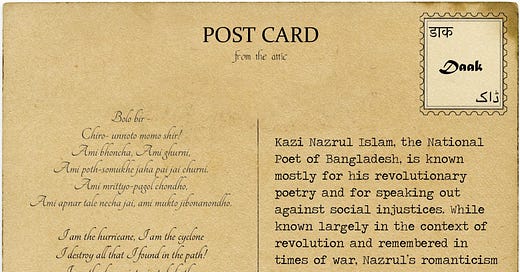Ami Bidrohi: The Fierce Romanticism in Nazrul Islam’s Poetry
Kazi Nazrul Islam, the National Poet of Bangladesh, is known mostly for his revolutionary poetry and for speaking out against social injustices. He advocated for religious pluralism — raised as a Muslim, he married a Hindu woman whom he fell in love with, to further solidify his fame as the rebel poet.
While also a writer of novels and short stories, as well as being a prolific musician, it is his poems that he is best known for. His poem “Notuner Gaan” (The Song of the Youth) is the national marching song — a war song — of Bangladesh.
chol chol chol
urddho gogone baje madol
nimne utola dhoroni tol
orun prater torun dol
cholre cholre chol
//
March, March, March
By a drum beat to a heavenly height
From earth beneath and soil’s blight
Youth rise in the dawn’s light,
Left, now, now, right!
March, March, March
Islam’s most famous work was a criticism of the British Empire — a poem titled “Bidrohi” (The Rebel). While largely known in the context of revolution, social mobilization and nationalism, Islam’s romanticism is often overlooked. His poetic repertoire includes a vast oeuvre of poems on love and nature. He wrote on subjects with a ferocity that is alive years after his death, yet at the same time his metaphors are poignantly romantic as “Bidrohi” shows us.
In this song of revolution, you find the rebel rooting himself within nature, comparing his rise to one from the womb of mother earth.
bolo bir –
bolo unnoto momo shir!
shir nehari amari notoshir oi shikhor himadrir
bolo bir –
bolo mahabishwer mahakash fadi,
chandar surjo graha tara chhadi,
bhulok dulok golok bhedia,
khodar ashon ‘arosh’ chediya
uthiachi chiro bisway ami bishwa-bidhatur!
//
Say, Valiant,
Say: High is my head!
Looking at my head
Is cast down the great Himalayan peak!
Say, Valiant,
Say: Ripping apart the wide sky of the universe,
Leaving behind the moon, the sun, the planets
and the stars
Piercing the earth and the heavens,
Pushing through Almighty’s sacred seat
Have I risen,
I, the perennial wonder of mother-earth!
Throughout the poem, one finds metaphors of love and lovemaking.
ami bonchito batha, Pothobashi Chiro griho-hara joto pothiker,
ami obomaniter morom bedona, bish-jala, Priyo lanchhito bukr goti fer,
ami obhimani, chiro-khubdho hiyar katorota, batha sunibirh
chito-chumbono-choro-kompono ami thor-thor-thor Prothom porosh kumarir.
ami gopon priyar chokito chahoni, Chhol kore dekha onukhon
ami chopol meyer bhalobasha, tar kakon churhir kon-kon.
ami chiro-shishu, chiro-kishor,
ami joubon-vitu polli balar achor kacholi nichor!
//
I am the unutterable grief,
I am the trembling first touch of the virgin,
I am the throbbing tenderness of her first stolen kiss.
I am the fleeting glace of the veiled beloved,
I am her constant surreptitious gaze.
I am the gay gripping young girl’s love,
I am the jingling music of her bangles!
I am the eternal-child, the adolescent of all times,
I am the shy village maiden frightened by her own budding youth.
And descriptions of the madness and wonder life brings us face to face with.
bolo bir –
chiro- unnoto momo shir!
ami boncha, Ami ghurni,
ami poth-somukhe jaha pai jai churni.
ami mrittyo-pagol chondho,
ami apnar tale necha jai, ami mukto jibonanondho.
//
Say, Valiant,
Ever high is my head!
I am the hurricane, I am the cyclone
I destroy all that I found in the path!
I am the dance-intoxicated rhythm,
I dance at my own pleasure,
I am the unfettered joy of life!
Not just love and nature, he also peppers his revolutionary poem with references to concepts from different religions, Gods and prophecies.
ami bojro, ami eshan-bishana ugkar,
ami Esrafilar shiggar moha-hugkar
ami pinak-panir domru trisul, dhormo rajar dondho,
ami chokro o moha shokkho, ami pronob-nad prochondho!
//
I am thunder,
I am Brahma’s sound in the sky and on the earth,
I am the mighty roar of Israfil’s bugle,
I am the great trident of Pinakpani,
I am the staff of the king of truth,
I am the Chakra and the great Shanka,
I am the mighty primordial shout!
Islam, tragically, lost his voice and memory at the age of 43 because of a neurodegenerative disease but not before he composed a body of work unparalleled in its depth and breadth.
(Translations by Kabir Chowdhury)
Want to buy a thoughtful present but don’t know what to get? Buy a Daak Gift Card and let your loved ones choose from a collection of gifts inspired by the art and poetry of South Asia.



